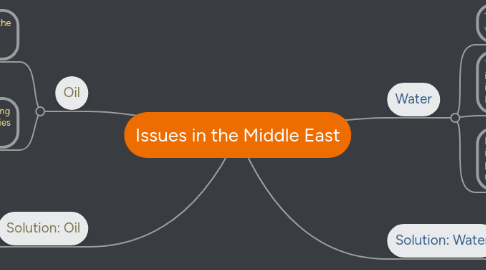
1. Oil
1.1. The issue is that there is lots of oil in the Middle East, but it's not distributed evenly.
1.1.1. Heavy smell
1.2. The people in the Middle East are not sharing the oil evenly and this causes some countries to get wealthy and some to live in poverty.
1.2.1. Also, since the countries don’t share the oil evenly, this causes some countries to own more oil than the other countries.
1.2.1.1. This also causes the country with the most oil to become very polluted and oil make the country look less flattering.
1.2.1.1.1. Another problem that they are facing is that since they don’t share the oil evenly, they have many arguments and disputes with each other.
1.2.2. In some countries, they are not distributing the oil to others equally, so those countries lose more and more money.
1.2.2.1. Since the government doesn’t get much money from the oil, the people who have jobs in the country will not get paid much money.
1.2.2.1.1. Also, since there is too much oil in some places, the people have to suffer the smell and the stickiness of where they live.
2. Solution: Oil
2.1. The way we can help solve this problem is that the countries could share the oil and people can have more job opportunities and the countries can all become wealthy.
2.1.1. The government could make a treaty so the everyone gets the same amount of oil or so that less oil is produced.
2.1.1.1. The way we can help solve this problem is that the countries could share the oil and people can have more job opportunities and the countries can all become wealthy.
2.1.1.1.1. People could start petitions to make it happen.
3. Water
3.1. There is a loss of water of water from farming needs.
3.1.1. Dehydration
3.2. The region needs plants because it is dry and very hot but there is a lack of plants because of the lack of water. 85% of the water is being used for agriculture. The article, “Water in Crisis-Middle East” states “Agriculture uses 85 percent of water in this region.”
3.2.1. Also, Desalination of the water is taking away sand and particles, but it is also taking away necessary nutrients.
3.2.1.1. This impacts the region because they take the concentrated salt from the desalination is dumped into the ocean which can affect the environment for local wildlife.
3.3. Desalination of the water is taking away sand and particles, but it is also taking away necessary nutrients. This impacts the people because they’re not getting the necessary nutrients needed. ”
3.3.1. Yemen has one of the highest worldwide rates of malnutrition and over 30% of it’s population is not meeting their water needs.
3.3.1.1. This means that many people are unhealthy, and are not getting the necessary nutrients that they need. In the text of “Middle East-Water Crisis Article” it states “The seawater used most in desalination plants has high amounts of boron and bromide, and the process can also remove essential minerals like calcium.
3.3.1.1.1. Also, the concentrated salt is often dumped back into oceans where the increased salinity affects the ocean's environment. The plants harm local wildlife and add pollutants to the region's climate.”
4. Solution: Water
4.1. We could contact Foeme. We can also donate money to The Water Project.
4.1.1. Both ways could help the Middle East get more sanitary water.

